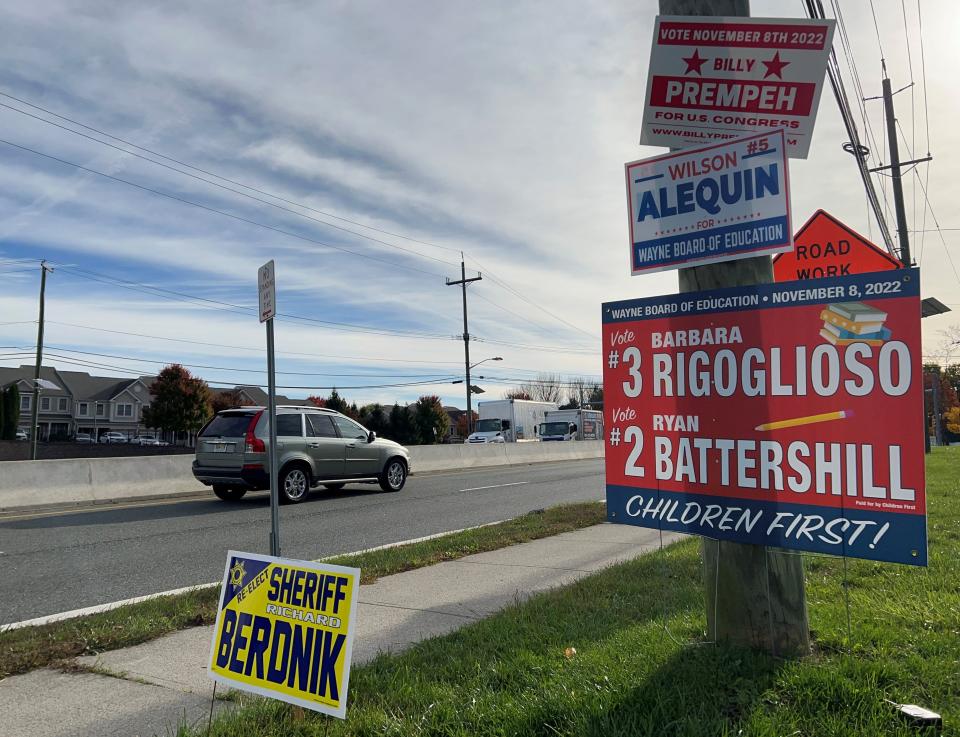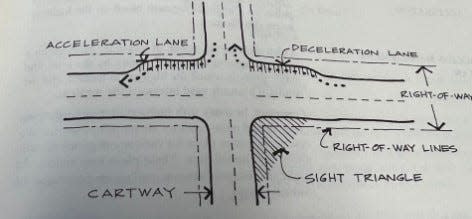Mahwah proposes banning signs on public property
MAHWAH — Election signs along public roads may become a thing of the past if a proposal is approved at a special Township Council session Wednesday at 6 p.m.
A proposal to ban non-commercial signs — political ones and others, like message signs — in public rights of way is up for a hearing at the meeting — and it could get as far as a vote.
"After this most recent election, many residents spoke to me about the sheer number of signs littering the township for almost three months," said Councilman Robert Ferguson. "This ordinance was crafted to address their concerns and align Mahwah's code with neighboring towns."
The special session was called because once an ordinance is introduced it needs to be adopted before the year's end or the process has to start over, said Township Administrator Ben Kezmarsky. Also on the agenda are two time-sensitive ordinances related to changes in the borough's affordable housing plan.
The sign ordinance cites "increasing instances where individuals place signs in Township rights-of-way without receiving approval" as the reason for the proposal. The impact, says the ordinance, is "degrading the aesthetic environment by littering public and private property, and blocking sight lines at intersections."
The full language of the ordinance is posted on Page 2 of the Dec. 21 agenda.
Scott McDowell, a spokesman for the New Jersey chapter of the American Civil Liberties Union, said the Mahwah ordinance "has to do with signs on public property, which doesn't raise the same civil liberties concerns because the government has discretion to regulate signs on its own property."
SIGN SUITEx-mayor says he got summons over American flags at gas station, sues Mahwah for $50M
WAYNE SIGN LIMITS'Like 42nd Street': Wayne mayor is taking a very hard line on unsightly political signs
"We focus on bans of signs on residential property," McDowell said.
The proposed Mahwah ban is for "non-commercial" signs, not just political signs. However, attorney Kenneth Cerullo has begun a petition on change.org objecting to its political impact.
"Public property for posting allows all equal opportunity to get some messaging out equally and inexpensively without being censored," Cerullo's petition states. "Alternatives of allowing signage on private property are not satisfactory. Often they are not easily viewed."

John Fesen, a frequent speaker at council meetings, has been emailing residents to attend Wednesday's hearing and object to the ordinance.
"Prohibiting the placement of election signs on municipal property restricts the voting information flow to all Mahwah residents and should not be allowed to happen," Fesen said.
Former Mayor William Laforet, who has been targeted more than once for signs and flags at his Franklin Turnpike Sunoco gas station, called the timing "unfortunate."
"I think the council has unfairly picked three days before Christmas and in the middle of Hanukkah to discuss such important ordinances as these," Laforet said. "The community once again is boxed out of these important discussions."
But where does the public right of way end? It depends, Kezmarsky said.
"All municipal roads have a specified right of way, usually 50 feet," he said. "If you have a road with a curb-to-curb width of 30 feet and if the road is centered on the right of way, you would have a distance of 10 feet from the curb to the right-of-way line."

So even on private property, signs should be back 10 feet from the curb.
Mahwah is not the only municipality with political signage debates. Wayne Mayor Christopher Vergano ordered an aggressive pickup of political signs posted on public property this October in violation of its ban on signs in the public of right of way, during what he called the worst election cycle ever.
"No voter lives on the island of Route 46," Vergano said. "The corner of Alps Road and Ratzer Road looked like 42nd Street until we had it cleaned up."
But as noted by the ACLU, limits on private-property signs are different. Wyckoff had to rescind part of its sign ordinance in 2017 that limited political sign displays on private property to one month and specified maximum sign dimensions. A similar attempt to limit how long political signs could be displayed on private property had to be eliminated from Glen Rock ordinances in 2016 after a similar ACLU intervention.
This article originally appeared on NorthJersey.com: Mahwah proposes ban on signs on public property

